#Native American cooking
Text
Sounds yummy
#cooking#indigenous#Native American cooking#native recipe#rice#🍚#native american#native#indigineous people#reservation#first nations#native tribe#paiute#tribal#tribe#rez#native america#native american history#nevada native#northern paiute#reservation dogs#colorado native#decolonize#history#nevada#recipe#cook#healthy
3 notes
·
View notes
Text
fuck it. fantasy old western au where zoro is a bounty hunter chasing down outlaws & pisses off the wrong sheriff at a saloon (axe hand morgan). he’s sent to the stocks, hours from dying from heat exhaustion under the hot desert sun, when young upstart monkey d luffy (in search of a stockpile of hidden gold that infamous outlaw gol d roger hid in the mountains) enters the scene guns literally a blazing
#zolu#one piece#I’m in arizona rn on a trip and I’m feeling inspired lmaoooooo#the outlaws are still themed like buggy still wears clown make up just vintage styled#nami is a bartender who swindles unsuspecting drunks. dreams of mapping the country and going to the west coast#sanji cooks in an abandoned train that zeff converted into a restaurant but he dreams of accessing spices and veg he can’t get in the deser#usopp lives in a mining town and kayas parents own the mine#there’s a bit of magic nothing as crazy as the devil fruit powers but there’s ghosts who roam#Native American mythos heavily influences the lore#monsters are real (the sheriffs are supposed to protect the town)#I could go on but I won’t lol
630 notes
·
View notes
Text
rewatching big eden w my head in my hands. wheres more media where the surrounding background is so devoid of homophobia/etc that its so chill to just have this quiet gay story w/o a single scene incl them having to justify or explain themselves, or any degree of hatred at them or other gays. n the town is not only chill they're actively trying to help them get together I'm. this aired in 2000 how do we not have. idk. more shit like this truly pretty casual chill regular relationship issues gay media
#txt#big eden#pike learning how to cook for him. pike ily#also not in <- main post bc its sexuality related. but pike being native american n being soft n kind etc like not following shit tropes idk#i wish we got a bit more bout him but w the type of movie and time period it was made i. do still love his character a lot#also i wish we got a side film about the lesbian couple
124 notes
·
View notes
Text
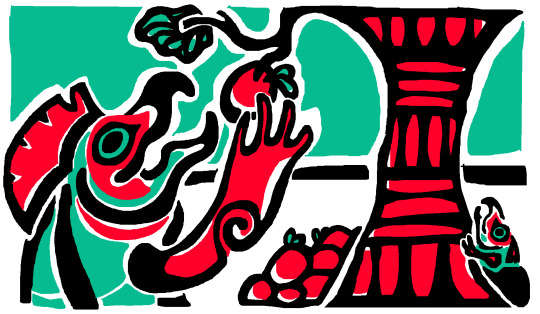
fishie friday. the salmonids are picking mangos
#splatoon#salmon run#splatoon chum#splatoon smallfry#a while ago i read that the salmonids and their art were inspired by north-west coast native american tribes#and ive recently gone down a rabbit hole of research. their culture is really cool!#this style specifically is based partially off of the kwakwakaʼwakw tribe#and i wanted to think about what salmonids would make art about traditionally.... i think they would make art of#them farming food and cooking it and hunting and stuff#and theyd probably have a lot of art regarding combat and passed-down family weaponry and such#boiledegg art
394 notes
·
View notes
Text
I come from a long line of people who raised hogs, smoked them in the earth as technique inherited from indigenous kin (who - more broadly - introduced the west to the method: more on that here!) and seasoned them beautifully.
so pork specifically meant a lot to my family... but it is also undeniably tied to hereditary health problems...
so here's a story on how we departed from that, what tradition even is, and what it means to me now ft the humble black eyed pea, for EATER!
some of my favorite panels:

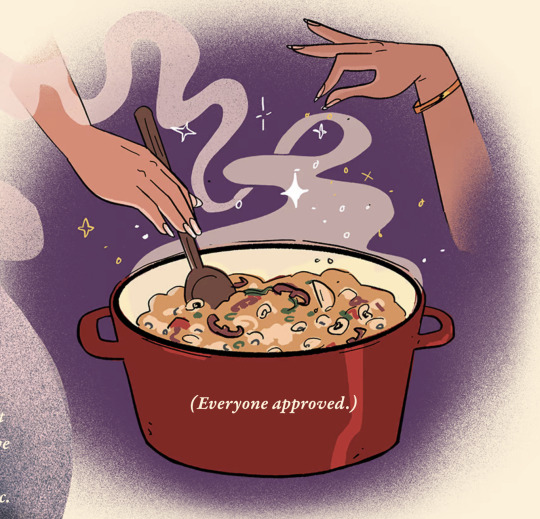
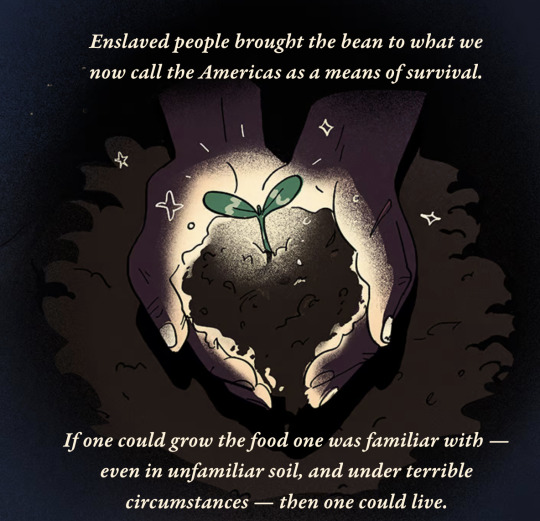
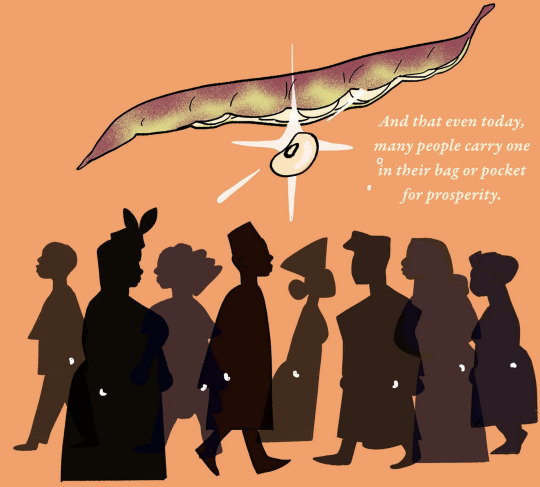
find the recipe for Yoruba àkàrà in my new book, COOK LIKE YOUR ANCESTORS <3
#art#comic#comics#illustration#cartoon#love#food#africa#african american#foodways#native#indigenous#barbecue#black eyed peas#heirlooms#mariah-rose marie#cook like your ancestors
36 notes
·
View notes
Text
colonisers in the last thousand years upon seeing literally any race of people for the first time: Good lord what the fuck is that. Yeah these guys are indians
#read through late 1700s journals owned by cook's fleet trying to research some specific things awhile back and was just like US TOO??#fucking. filipinos 🤝 native americans 🤝 māori 🤝 indonesians 🤝 CHarmoru 🤝 literally everyone else for some reason
14 notes
·
View notes
Text
“The question led Barton to scholars like David Morgan and Kristen Gremillion, and obscure discoveries in places like Kentucky’s Red River Gorge, a 29,000-acre canyon system in the Daniel Boone National Forest.
Before the Gorge finds, archaeologists “assumed that the peoples of this region just sat around passively, waiting for others to send them the gift of agriculture,” says Morgan, director of the National Park Service’s Southeast Archaeological Center. “But that simply wasn’t the case.”
Plant materials recovered by archaeologists in the Gorge in the 1980s and ‘90s led to a historical revision “that fundamentally alters how we think about indigenous peoples of the [precontact eastern U.S.],” says Morgan. A trove of ancient seeds debunked then-dominant theories “depicting early inhabitants as backwater nomads that didn’t acquire agriculture—and thus the markers of complex society—until after A.D. 1, when maize arrived from Mesoamerica.”
Gremillion, a paleoethnobotanist, chairs the Ohio State University department of anthropology and is the author of Ancestral Appetites: Foods in Prehistory. She started working in the Gorge around 1989, using techniques such as direct radiocarbon dating and high-magnification microscopy to study ancient caches of seeds, food stores, cooking refuse, and human feces. She found specimens buried under massive stone outcroppings and in caves—all in remarkable condition.
“We found things like 3,000-year-old sunflower heads and baskets full of seeds,” says Gremillion, who compares the digs to opening storage vaults. The finds were unprecedented, and old vanguard archaeologists were dismissive. “They said the materials couldn’t possibly be so old.”
Gremillion’s research proved them wrong; the region’s indigenous peoples had been farming for more than 5,000 years. The work helped establish the Eastern Woodlands as an independent center of prehistoric plant domestication and agricultural development—alongside areas like southeast Asia, Mexico, and the Fertile Crescent.”
#appalachia#cherokee#cuisine#ancestral appetite#Kristen gremillion#atlas obscura#nico albert#taelor barton#native american#cooking#recipes#pre contact
200 notes
·
View notes
Text
So apparently I've been foraging and eating wild onions wit eggs my whole life because I am Native and not because I'm Black....

#because the amount of niggas in the midwest commenting they dont know wtf im talking about is appalling#i looked into it and apparently the real name of this dish is Cherokee eggs and is tradtional Native American tribes from the plains#whicu makes total fucking sense to me know and as to while it was the first dish my granny learned to forge and cook#but ive only know and been taught Black or Black Cherokee Plains forgers all my life sooo#like we had both the tamale lady but also the wild onion/mustad green lady ya know?#anyway#learn how to forge and live off the land you live on and support native plants to your ecosystem#black culture#indigenous culture#midwest#foraging#live off the land#where my Afro-Cherokees at?#Where my Afro-Indigenous at?
52 notes
·
View notes
Text
78 notes
·
View notes
Text
Made Chickasaw Indian Molasses Bread today (it’s very good and very simple, check it out) and made my own grape juice as step one for our tribes Iconic grape dumplings.
For the juice, you can buy grape juice or just get really small, dark grapes and boil them. Then you strain out the skins + remaining fruit flesh. It’s really delicious! I recommend trying it even if you don’t want grape dumplings.
14 notes
·
View notes
Text

#indigineous people#indigenous food#food history#vegetables#cooking#biodiversity#native american#twitter
7 notes
·
View notes
Text

Hopi basket, c.1800s.
Region: Arizona.
The Hopi are a Pueblo people, named for the are they inhabited. They continued the tradition of basketry that reaches back to the ancient peoples of the area. Basketry artefacts of the ancestors of the Pueblo tribes has been discovered ere, and these peoples have been dubbed the ‘Basket Maker Culture’ by archaeologists.
The trade network of the Pueblo extensive , and the decoration of goods was much influenced by contact with other cultures, including Mexican. Basket-making was exclusively carried out by women, whose wisdom and knowledge of the craft was essential for the making of quality bowls and baskets used and traded by the tribe. They understood the ecology of the surrounding area, and knew where the plants used in the making of the fibres could be found. They made assessments of the value of the materials and prepared them for specific uses. Many plants were used to make fibres from which the baskets were woven, including roots and grasses. The material chosen depended on the function of the basket – whether it needed to be particularly strong or water-retentive. Baskets were used for cooking until superseded by clay pots; the fibres were very tightly woven and any liquid they held would cause the material to swell and so retain it. Hot rocks were then put into the baskets to cook the contents.
Source: ‘Folk Art’, Susann Linn-Williams, pp. 182 – 83.
#Native American#Native American women#Hopi tribe#Pueblo#traditional crafts#trade#basket#cooking#Arizona#utensils
5 notes
·
View notes
Text
“hurr hurr hee hee British ppl don’t know how to cook and their food is so bland bc they don’t know how to use spices even tho they stole em from the worl trolololol” Americans who have never left their country and have never read a single history book I beg you to for once shut Up. Abeg
#ENGLISH people have bland tastes bc they’ve always been working with a limited range of foodstuffs since time immemorial#colonialism and cruelty were only parts of the whole reason why the English were constantly importing foods from their colonies#NOTHING grows in that country unless out of spite#the ground is literally radioactive for fucks sake.#the soil quality is unbelievably poor and makes for TERRIBLE growing conditions of most crops except super hardy ones#along with the infrequent sunshine and constant rain and eternal dampness that persists year round#indigenous wild animals are also not a Thing and haven’t been for like centuries due to having been hunted to near extinction since#so ‘wild game’ is long lost to history and reserved only for environment-hating elites these days#plus: food over there has always been insanely expensive but even more so these days#you’re fucking Native you should know damn well about food deserts and predatory pricing#it is exactly as bad as reservation prices. except across the entire country - not just localised in certain areas#so many things wrong with your shit post disguised as a ~~~~joke~~~~#but the core problem is that you are a stupid fucking yank luxuriating in your own ignorance#and then having the nerve to pat yourself on the back and be all ‘woe is me’ bc ppl r rightfully calling you out for it. fuck you#hot tip: stay in your fucking lane if you don’t know shit#and don’t double down when yr ignorance and classism is brought to light maybe#im glad you turned off reblogs on yr stupid post bc u were rightfully getting cooked and you knew it#and yet yr bruised ego won’t let you actually delete it. grow up#I blocked the op of that idiotic post so he’ll never see this and good riddance for that. fuck him for real#plus any other idiot Americans who agreed with him. fuck all of you too I hope you lose access to all the foods you love forever#yelling and snarling
5 notes
·
View notes
Text
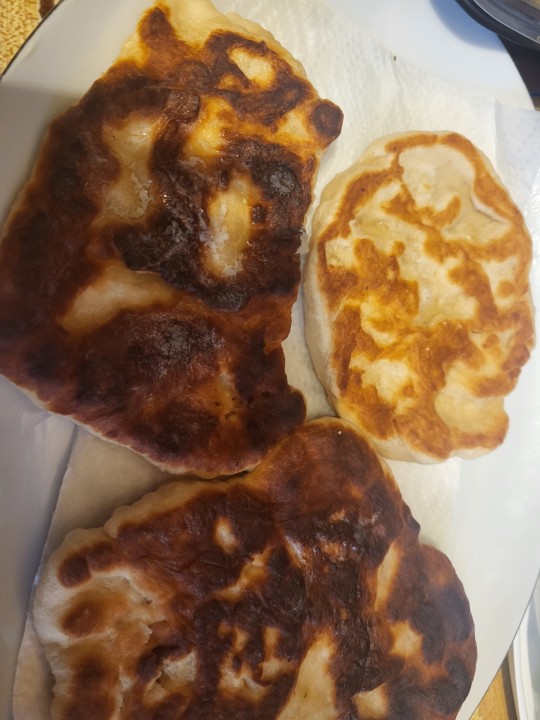
Native frybread (long-standing family recipe): made 12-3-2024
#food#comfort food#ex chef#cooking#ex culinary major#culinary#cook#baking#bakery#baker#home recipes#recipes#family recipe#ancestors#native american#native recipes
0 notes
Video
Sean Sherman cider braised turkey thighs-Yellowstone cookbook by Jackie Alpers
Via Flickr:
The relationship of Indigenous tribes to their land is a central theme in the Yellowstone TV series and I am honored to include Sean Sherman’s recipe for Cider Braised Turkey Thighs from his James Beard award winning cookbook, The Sioux Chef's Indigenous Kitchen in The Unofficial Yellowstone Cookbook. A portion of the sales of my cookbook will be donated to NATIFS (North American Traditional Indigenous Food Systems), promoting Indigenous foodways education and access. Visit natifs.org/ to learn more and make a dontation.
#Unofficial Yellowstone Cookbook#westerns#Jackie Alpers#recipes#western food#cooking#food#food photography#The Unofficial Yellowstone Cookbook#Indigenous Food#Indigenous Foodways#Indigenous#native american food#flickr
1 note
·
View note
Text
I think what's important to remember about cooking is that, like it or not, a dish exists in a certain context, that will affect how it's made or sometimes even enjoyed.
Mother cuisine, cultural exchange, availability of ingredients (which in turn is dictated by geography and how developed a country is), technology available, amount of people being cooked for, hell, even just the exact form of housing someone lives in (and the exact kitchen they're in), and not to mention the cook's and consumers' taste (which, unlike with books, games, or movies, there is actually accounting for) and abilities - it all affects how people cook
I could bring up xeno-american cuisines compared to the xeno cuisine's country of origin as a very fine example here, but I'm actually gonna bring up a very simple example of how my own cooking has changed with the change of circumstances I live in:
So I'm an autistic, Polish college student (italian studies), who lives in a dorm. The moment I moved into the dorm, the context of my cooking has changed DRASTICALLY: I have only two pans and one pot, three knives, a bunch of latex and wooden spatulae and other tools (including tongs), three bowls, a few instances of tupperware, a colander (this one will be relevant), at first no fridge but roommate secured a small one and is nice enough to share it with me, I buy ingredients as I need them in small quantities and using them as soon as possible, have to use a communal kitchen (which is sordid a lot of the time) with a gas stove (until I moved into the dorm I only used induction) that's relatively far away from my room (meaning I have to put everything I need for a dish into a bag or a box and carry it over in one or two goes).
It's inconvenient to cook for me in the dorm to say the least, but I cook anyway because I know how to, and honestly in the long run it's cheaper for me than McDonald's, and definitely way more healthy
Now, one of the dishes I cook the most often, because of how simple yet tasty it is, is spaghetti aglio e olio (living up to my major lmao).
Now, a typical recipe for SAeO is: boil pasta, fry minced garlic in olive oil (depending on recipe: also add chili flakes), save a tablespoon of pasta water and drain the pasta, mix herbs and spices into the pasta, and then toss the pasta with the garlic oil and the tablespoon of pasta water in the pan.
the first time I made SAeO it was exactly that way, and you know what it was like to me? Tedious. I hated the thought of losing any of the noodles to the dirty sink, so instead of putting the colander in the sink and pouring the contents of the pot into the colander, I began holding the colander above the pot, and fishing out the pasta with tongs (also makes it easier to use the pasta water too!), but it was still tedious to do. Not to mention the colander meant one more thing to wash before eating (communal kitchen = it's annoying when you leave your stuff there for too long), and one more thing to pack into a plastic bag when preparing for cooking and going back to the room.
So you know what I started doing instead? I simply fish the pasta out of the pot with tongs, and put it directly into the pan with the garlic oil (where I also put the herbs and spices because it brings out more of their flavours and aromas) with no draining. It achieves the same effect as saving that spoon of pastawater, while being more convenient in the context I find myself in, and in the long run in probably any other context I might find myself in (I still do that when I come home for holidays, because it's simply so much more convenient).
Now, if I have any Italian followers, I'm sorry if this method is unorthodox or otherwise inauthentic, but that's simply the adaptation I made in the context I found myself in, and the final result tastes just as good using either method!
Same goes for ingredient substitutions - if I can't get pancetta for my carbonara, I'll just use one of the many Polish wędliny (smoked meats), because that's the context I find myself in, and it will taste just as good as it would if I used pancetta.
I do not claim my versions of dishes to be authentic, of course, I only want to make it clear, that all the changes I make to the original dish stem from the context I found myself in.
There is one joke-anecdote I've read somewhere that went a bit like this:
Someone makes a roast for their guests and they ask why did they cut off the ends of the roast meat before cooking.
The host answers "oh, that's because how my mum did it, and that's how she taught me to do it!"
So the guests asked the host's mum, and she said "oh, that's because my mum did it, and that's how she taught me to do it!"
This continues a few generations back, until one of the fore-grandmas answers "that's the only way it would fit in the pan for me"
It's very possible that his ancestor's ancestors did the roast WITHOUT cutting off the ends, but because that one fore-grandma's pan happened to be smaller than her ancestors', she had to adjust her method.
And I think that sums up everything about cooking, really. You cook with what you have, what tools you have, what you know works, what you find out works et cetera, et cetera. And as long as you don't fight others on what's "authentic" and what's "fake", and instead focus on saying "oh, I tried to do it this way recently, and it was so much easier/tastier/less messy/etc" it's 100% fine.
#jamie's diatribe#long post#cooking#tips#everything exists in a context#pondering#contemplating#thinking#analysing#analyzing#because you americans decided to make spelling harder for us non-native english speakers /lh
1 note
·
View note
